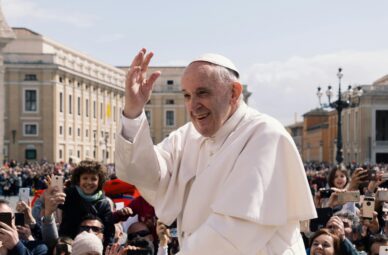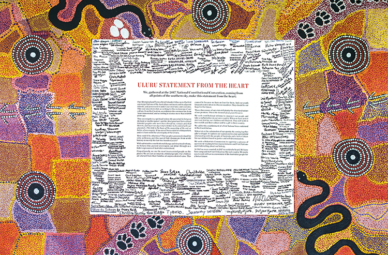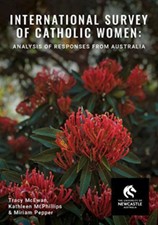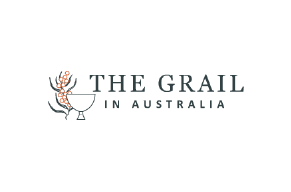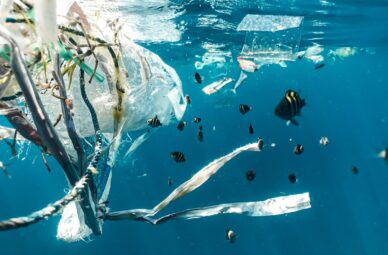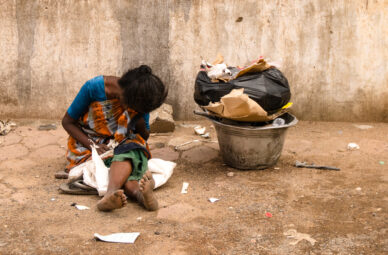
Eco-Spirituality | God the Trinity
May 25, 2017Welcome to the third in a five-part series written by Patricia Gemmell on the topic of Eco-Spirituality.
Part 1 The Context for Ecological Theology and Spirituality
Part 2 Reclaiming our heritage
Part 3 God the Trinity
Part 4 Women's voices
Part 5 Eco-Spirituality
Part 3
The theologian, Denis Edwards, who has written prolifically on the subject of ecological theology has said that “the most important theological foundation for an ecological praxis is to be found in the doctrine of God” (Edwards 1998-99, 126). So that is what I am going to explore in this article.
When we put together the evolutionary story of the cosmos with the Biblical story and the gospels, what can we discover about God?
Faith in our day must seek understanding from the new knowledge that science gives us. Or, as O’Murchu tells us,
“We need to outgrow the small God who perhaps served us well at one time in our lives…The God who outpaces all our constructs and who unceasingly lures us to radically new places and new ways of being is the God of our great evolutionary story. This is not about inventing a new religion. It is about reappropriating the archetypal divine story that creation itself has been narrating long before we humans ever inhabited that creation. It is about realigning our perspectives and perceptions” (O’Murchu 2002, 55).
O’Murchu is wonderfully poetic in how he tries to realign our perspectives and perceptions, to convey a sense of the Creator God’s prodigious creativity and innovation, extravagance, generosity, faithfulness and love. Evolutionary Faith is a great book to read; it is an invitation to come home to ourselves in God and the cosmos, to become mystics once more, to become truly ourselves, and to live in hope for the future. He makes the point that “evolutionary theology postulates that creation itself is the primary and most basic evidence for the divine at work in the world” (O’Murchu 2002, 88). However, for systematic theological investigation into an ecological understanding of the nature of God, you can do no better than go to the works of Elizabeth Johnson and Denis Edwards. These two theologians are very much in agreement with one another when it comes to the doctrine of God, and not surprisingly they quote each other often in their work.
However, for a systematic theological investigation into an ecological understanding of the nature of God, you can do no better than go to the works of Elizabeth Johnson and Denis Edwards. These two theologians are very much in agreement with one another when it comes to the doctrine of God, and not surprisingly they quote each other often in their work.

What does she say about God? She explores three aspects of God’s indwelling presence in creation, namely that it is continuous, that it is cruciform, and that it abides as promise for the future, and she considers how God acts in creation. Underpinning everything is her deeply felt sense that the Creator Spirit is dynamically alive: “the Spirit is the vivifier, the one who quickens, animates, stirs, enlivens, gives life even now while engendering the life of the world to come” (Johnson 2014, 128-9). It’s this dynamic sense of presence that she wants us to take hold of.
When I was a child, one of the first questions in the catechism was “Where is God?” and the answer was “God is everywhere.” In one sense, Johnson is not saying anything new when she tells us that God dwells within the whole of creation, continuously. It is not so very difficult to accept the truth of that. However, in sketching Christian history she shows how humanity and humanity’s sinfulness came to become our central concern, with creation becoming forgotten and theologians losing all interest in it. So although we proclaimed that God was everywhere, we did not usually take creation seriously as God’s dwelling place, nor did we envision God’s presence there as being continuously creative. God’s continuous and mysterious presence as sustaining and enlivening and still creating at the heart of every created thing is something that ecological theologians want us to take very seriously indeed. We, and the whole of creation, are still evolving.
Johnson perceives that God alive and active in our world is the Spirit, that often forgotten person of the Trinity, but who is called vivificantem, “the Lord and Giver of Life” in the Nicene Creed. In order to nourish our imaginations with regard to the Spirit, Johnson takes us to the Bible and the wonderful Biblical images of the Spirit as wind, water, fire, bird and, finally, Wisdom. Rich resources here for our spirits. But let us not forget the reality of nature as well as Biblical poetry. The world of nature can also teach us about God if we give it our attention. As Augustine said,
Others, in order to find God, will read a book. Well, as a matter of fact there is a certain great big book, the book of created nature. Look carefully at it, top and bottom, observe it, read it. God did not make letters of ink for you to recognize him in; he set before your eyes all these things he has made. Why look for a louder voice? Heaven and earth cries out to you, “God made me.” You can read what Moses wrote; in order to write it, what did Moses read, a man living in time? Observe heaven and earth in a religious spirit (Johnson 2014, 152).
Or as Johnson herself puts it, “Earth is a physical place of extravagant dynamism that bodies forth the gracious presence of God. In its own way it is a sacrament and a revelation” (Johnson 2014, 150). Pope Francis goes even further. He says, “the entire material universe speaks of God’s love, his boundless affection for us (LS 84).”
Personally, I find the Wisdom literature of the Hebrew Scriptures particularly helpful in nourishing my religious imagination about the Creator Spirit. You will understand why when you read what the American biblical scholar, Kathleen O’Connor, has to say on this subject:
At the center of the Wisdom literature stands a beautiful and alluring woman. She is Lady Wisdom, or as I prefer to call her, the Wisdom woman. The primary mode of being of the Wisdom Woman is relational. In all the texts where she appears, the most important aspect of her existence is her relationships. Her connections extend to every part of reality. She is closely joined to the created world; she is an intimate friend of God; she delights in the company of human beings. No aspect of reality is closed off from her. She exists in it as if it were a tapestry of connected threads, patterned into an intricate whole of which she is the center (O'Murchu 2002, 70).
O’Murchu says that “the evolutionary story being told in our time evokes these three concepts – aliveness, wisdom, and relationality – with renewed vigor and meaning” (O”Murchu 2002, 70). These three concepts are very much at the heart of what Johnson (and Edwards for that matter) has to say about the Creator Spirit of God, and both of them have much to say about the relationality within God the Trinity. While not wishing to go into this in any detail, I will just remark that for Johnson the trinitarian framework is of utmost importance for grounding what the Spirit does in the mystery of God’s divine life (within the framework of God as Trinity, Johnson regards the Spirit as God alive and active in the world), while Edwards has written a great deal about God as communion, “a Trinity of endlessly dynamic mutual love” (Edwards, “Planetary Spirituality,” 19).
Every created thing is God’s dwelling place, but it is also true that every created thing dies. The story of evolution that has seen ever more complex, ever more diverse, ever more beautiful forms of life is also a story of pain and suffering and death over millions of years. But, as Johnson points out, it was pain and suffering that pushed animals to evolve in different ways, it was death that always brought about new life for something else.
However, if you allow your imagination to try to take in millions of years of this evolutionary process of life, in which the struggle for survival always results in pain and death for some, you may be “struck dumb” like Elizabeth Johnson. In order to deal with it theologically (and remember, we are speaking here only about the natural world before humans came on the scene), in order to think theologically about death “as part of the creative process on this planet” (Johnson 2014, 189), in order to come to terms with the tragic dimension within the life of the natural world, Johnson proposes something utterly different to what we are used to hearing. She proposes that the affliction arose from within the evolutionary process itself and was NOT ordained by God. In other words, creation was granted its own version of free will – theologians call this the “free process” position and “free process in nature works in ways not necessarily always according to divine design” (Johnson 2014, 191). What she is suggesting is that death, pain and suffering somehow arose through nature’s choices, which God allowed nature to have.
Traditionally, we know, theology teaches us that pain and death came into the world through the sin of one man and woman. An evolutionary theology, it seems to me, cannot hold onto that belief. Pain, suffering and death are inexplicable mysteries, and Johnson asserts that God is to be found in their midst, holding out the promise of something more. The Old Testament prophets knew this, while the gospels tell us of God who became one of us, suffered the most appalling agony and anguish imaginable by dying on a cross, and yet was raised to new life by the power of God. The story of evolution and the gospel story both tell a similar tale of new life arriving through pain and death. This is what we mean when we say that God’s presence in nature is cruciform. God, the Creator Spirit, the Lord and Giver of Life, who dwells within all creatures, does not abandon them in their suffering but suffers with them.
The Incarnation takes on new meaning in an evolutionary context. “The Word became flesh,” says John’s gospel. But human flesh, we know, is not only human flesh. As Johnson says,
Scientific knowledge today is repositioning the human species as intrinsic part of the evolutionary network of life on our planet, which in turn is a part of the solar system, which itself came into being as a later chapter of cosmic history. The landscape of our imagination expands when we realize that human connection to nature is so deep that we can no longer completely define human identity without including the great sweep of cosmic development and our shared biological ancestry with all organisms in the community of life. We evolved relationally; we exist symbiotically; our existence depends on interaction with the rest of the natural world. Relocating anthropology in this broader context provides the condition to rethink the scope and significance of the incarnation in an ecological direction. The flesh that the Word of God became as a human being is part of the vast body of the cosmos…The flesh assumed in Jesus Christ connects with all humanity, all biological life, all soil, the whole matrix of the material universe down to its very roots (Johnson 2014, 195-6).
What Scripture has long intimated, science now confirms: “the incarnation is a cosmic event” (Johnson 2014, 196). What does this “deep incarnation” add to whatever previous understandings we may have had about the incarnation?

And if we claim as Christians to want to grow into the likeness of God, what does it mean for us when Johnson says, “Calvary graphically illuminates the insight that the God of love whose presence continuously sustains and empowers the origin of species is a God of suffering love in solidarity with all creatures’ living and dying through endless millennia of evolution, from the extinction of species to every sparrow that falls to the ground” (Johnson 2014, 205). Do we ever consider the pain of animals as something that God shares? The eco-theologians think that we should.
Johnson quotes this beautiful paragraph from a friend of hers, who wrote a meditation on Jesus’ words on the cross:
I suddenly understood that in his final death scream Jesus gathered up all of the earth’s suffering throughout all time, bound it up and presented it before the heavenly throne, not in reams of words but in a sacred package encompassing the sorrows, the sufferings, the lost dreams of all creation, all peoples, all times, all conditions, and carried it directly to the pulsing, loving heart of the living Trinity, where it is now. Jesus screams, and he, full of grace and truth, thereby took his and all anguish and transfigured it into a means of touching God (Johnson 2014, 206).
And finally, “deep incarnation” means “deep resurrection.” Jesus’ bodily resurrection from the dead portends the resurrection – whatever that might mean (and we cannot begin to imagine it) – of the whole creation. And here we come to the third aspect of God’s presence – it abides as promise for the future.
Scientists tell us that this world and indeed the whole universe will one day come to an end. The sun has enough fuel for another 5 billion years and then it will die. In the face of these calculations, theology dares to say differently. Theology dares to say that there will be a new heaven and a new earth. The evidence for such belief is the lived experience of a God who is always faithful. Remember the rainbow covenant made with Noah and his descendants and every living creature with him, a promise made by God with absolutely no conditions.
I don’t need to take you through our sacred story to show you that nothing is impossible with God or that God is always faithful. The early Christians certainly believed in redemption for the whole created order: look at Paul in Romans 8:18-25 (in which he foresees a time when creation will be set free from its bondage to decay) or the great hymn in Colossians 1:15-20, in which God was pleased to reconcile to himself all things, whether in heaven or on earth. Read the letter to the Ephesians 1:10, or God’s promise in Revelation: 21:5, “See, I am making all things new.” The whole universe may hope for a future in God.
At this point I want to come back to the Incarnation, the central Mystery of our faith. We all know the story that the Church has most consistently embraced and taught, which, in its simplest form, goes something like this: God created the world and it was good, Adam and Eve sinned – the Fall from goodness, mankind and creation were somehow broken, so God sent his Son to repair the damage by sacrificing his life in atonement for the original sin. God accepted Jesus’ redeeming sacrifice by raising him from the dead. In this story, the Incarnation has to be seen as the consequence of mankind’s sinfulness in need of redemption.
There is, however, an alternative story, a different theology, one that we hear about less often. It’s a theology that goes back to Duns Scotus, a Franciscan theologian of the 13th century, who believed that the Incarnation would have happened whether Adam sinned or not. It’s a theological story that can be found in the writings of that great theologian of the twentieth century, Karl Rahner. And finally, it is a story being taken up by contemporary ecological theologians, including Elizabeth Johnson and Denis Edwards. I would now like to spend some time on that story.
This is a story of creation as divine self-bestowal, that takes seriously both the scientific story of evolution and the Biblical story of God’s creative, sustaining and salvific love. It’s a story that I cannot do justice to in my own words, and so I am going to have to rely on the words of our theologians here. Edwards says:
God chooses to give God’s self in love to what is not divine, and so creation comes to be. This is the central insight in Rahner’s theology of creation…It is a Trinitarian act of self-bestowal: God gives God’s self in the Word and the Spirit, in diverse ways, in creation, grace, incarnation, and final fulfillment.
A second assumption is that the incarnation is central to God’s purpose in creating. While one tradition of Christian theology has assumed that the incarnation comes about as a remedy for sin, another has held that God’s intention from the beginning was to give God’s self to creation in the incarnation…Taking up this tradition, Rahner holds that God freely chooses, from the beginning, to create a world in which the Word would be made flesh and the Spirit poured out. In this view the Christ-event is not thought of as an addition to creation. It is not primarily a corrective for a creation that went wrong. It does not come about simply as a remedy for sin, although in the light of sin, it is certainly a radical act of forgiveness, healing, and liberation. In this theological approach, God’s self-giving in the incarnation is the very purpose and meaning of creation (Edwards 2010, 39-40).
This is what Rahner has to say on the subject:
God is not merely the one who as creator establishes a world distant from himself as something different, but rather he is the one who gives himself away to this world and who has his own fate in and with this world. God is not only himself the giver, but he is also the gift. For a pantheistic understanding of existence this statement may be completely obvious. For a Christian understanding of God, in which God and the world are not fused but remain separate for all eternity, this is the most tremendous statement that can be made about God at all. Only when this statement is made, when, within a concept of God that makes a radical distinction between God and the world, God himself is still the core of the world’s reality and the world is truly the fate of God himself, only then is the concept of God attained that is truly Christian (Edwards 2010, 41).
What does it mean to say that the world is the fate of God? What is our response to that?
And here is how Elizabeth Johnson sees it:
God is unfathomable love; love seeks union with the beloved; this union occurs in the incarnation when the divine Word enters into personal union with the created world in Jesus Christ. Even if Adam and Eve and their descendants were still innocently in the Garden, this would have happened; it is the way love acts… the incarnation is not dependent on the sin of our first parents. It was Love’s very intent from the beginning (Johnson 2014, 226).
And if that leaves you wondering about the meaning of the cross and our salvation, she explains it very simply:
To be sure, the death of Jesus is indissolubly connected with sin. It is an epitome of the evil humans do to each other for state power to take a healthy man and reduce him to a bloody corpse through torture and violence. Scotus…however, locates its redeeming power not in satisfaction rendered to a God whose honor has been violated, but in the presence of divine love in the flesh enacting an historical solidarity with all who suffer and die (Johnson 2014, 226).
Time now to stop and reflect on this.
How does God act in an evolutionary cosmos? Many contemporary theologians are trying to grapple with this question. As Diarmuid O’Murchu tells us, “We are embarking upon a radical re-visioning of how we understand the divine to be at work in creation. Most significantly, we are abandoning the idea of an outside manipulator (engineer) in favor of an animating force from within, not because it gives us humans more power, but because the evidence of evolution requires us to make that adjustment” (O’Murchu 2002, 51).
Both Elizabeth Johnson and Denis Edwards have contributed enormously to this work of re-visioning, and they are very much in agreement with each other. What I am about to explain comes primarily from Denis Edwards’ book, How God Acts: Creation, Redemption and Special Divine Action, chapter 3, called “Creation as Divine Self-Bestowal,” but if you are particularly interested in what Elizabeth Johnson has to say on the matter, read chapter 6 in Ask the Beasts.

In reflecting on this idea of God as always present in creation, always enabling its existence, its flourishing and its growth, Edwards concludes that God can never be considered to be apart from or outside of creation. Which also means that God cannot intervene “from the outside” as it were or break the laws of nature. Because the way God “acts” is to “act” through creation itself, allowing it to be a partner in its own emergence, evolving and organizing itself through its own natural laws. God allows creation its own integrity and autonomy.
See how beautifully Elizabeth Johnson describes this:
Two agencies of qualitatively different magnitudes are present in the same worldly action: the autonomous creaturely agency which enacts it, and the divine agency which founds, sustains, and empowers it. These are not two actions doing essentially the same thing, acting in a parallel way, each contributing to part of the effect. Brought to life by divine generosity, creatures are genuine centers of activity that operate with their own causal efficacy, interrelated and dependent on each other as well as on God, while the ineffable, transcendent Mystery dwelling within the evolving world continuously creates through the world’s own autonomous processes, letting it be and self-spending in an outpouring of love (Johnson 2014, 168-9).
There is a tremendous risk in all this, of course, and we see it in all the human tragedy of the world today. We see it too in the Christ-event, in which God is revealed as vulnerable, self-giving love. When the world rejected Jesus and nailed him to a cross, God was, in one sense, powerless to intervene. What he did was to accompany Jesus in his suffering and to transform him in the Spirit to new life in God.
In Edwards’ words, “It appears from the Christ-event that God’s way is that of being committed to allowing events to unfold, even when they are radically opposed to the divine will, and to bring healing and liberation in and through them.”
He goes on to say, “It makes an enormous difference whether one thinks of God as able to do absolutely anything or acting in a way that lovingly respects and accepts the limits of finite processes and entities….God’s love is of a kind that respects and works with the limits of creaturely processes” (Edwards 2010, 51).
It goes against the grain for many of us to think that God is limited in power, but that is exactly what the eco-theologians are saying. And this limit of freedom and power upon the divine will is precisely because God is self-giving, self-emptying Love. Imposing one’s will is not the way of Love. But faith tells us that God is faithful. Out of the horror and tragedy of Good Friday, God was able to overturn failure and death. Herein lies our ultimate hope, but surely what evolution teaches us about God and God’s relationship to us is that we have serious responsibilities for the world we live in. If God can only act through creation, then we human beings especially must work far more diligently on our own evolution as responsible caretakers of this planet.
I asked the question earlier, “What does it mean to say that the world is the fate of God?” In the light of eco-theology, one meaning is clear, I think. The world is our fate too.
Morning Reflection
Prayer by Mary Oliver
It doesn’t have to be
the blue iris, it could be
weeds in a vacant lot, or a few
small stones; just
pay attention, then patch
a few words together and don’t try
to make them elaborate, this isn’t
a contest but the doorway
into thanks, and a silence in which
another voice may speak.
References
Edwards, Denis 2010, “Planetary Spirituality: Exploring a Christian Ecological Approach,” Compass 4: 16-23, http://compassreview.org/summer10/7.pdf (17 March 2016).
Edwards, Denis 1998-99, “Theological Foundations for Ecological Praxis,” Ecotheology 5 & 6.
Francis 2015, Laudato Si.
Johnson, Elizabeth A. 2014, Ask the Beasts: Darwin and the God of Love, Bloomsbury, London.
O’Murchu, Diarmuid 2002, Evolutionary Faith: Rediscovering God in Our Great Story, Orbis Books, Maryknoll, New York.

Patricia is a wife, mother of four, and a retired teacher of French, Latin and Italian. She graduated with a Masters in Theology at Newcastle University in 2014. She is a member of the Sydney Grail group and currently serves on their national leadership team.






